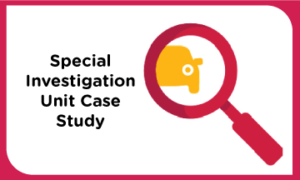Insurance fraud can be classified in two categories: hard fraud and soft fraud. Hard fraud involves deliberately causing damage to collect on an insurance policy. Soft fraud is more common and includes exaggeration of the severity or extent of damages to the claimant or vehicle to increase the insurance payment. Soft fraud also includes misrepresentation or intentional omission of information to obtain a lower insurance premium.
The Event Data Recorder (EDR) device is a new tool Maryland Auto’s Special Investigations Unit (SIU) is utilizing to fight fraud. Just like an airplane’s black box, this device reads data captured by vehicle’s onboard computer, such as speed and braking. In addition to debunking fraud, the availability of data from EDRs is also preventing the submission of fraudulent claims.
Recently, Maryland Auto received a claim initiated by a claimant’s attorney. They stated their client was stopped at a red light when a Maryland Auto policyholder rear-ended their car.
Maryland Auto’s adjuster contacted the policyholder who denied involvement in the crash. They claimed that they were behind a small car that struck the claimant’s vehicle and fled the scene. The policyholder said that he pulled over, checked on the driver of the damaged car before getting back in his own car and leaving.
Given the conflicting accounts, the claims adjuster contacted our SIU team to ask if an EDR study could be performed on the policyholder’s vehicle. This would either confirm or rule out an impact.
Once our SIU team confirmed they could run the test, the adjuster contacted the policyholder to arrange the EDR inspection. Upon learning that we had the capability to access the EDR data, the policyholder admitted the truth, that their vehicle had in fact “tapped” the claimant’s vehicle.
What could have been a lengthy investigation was significantly shortened, thanks to the data available from the EDR.
Maryland Auto was able to assist the claimant with their damages and injuries from the crash.




